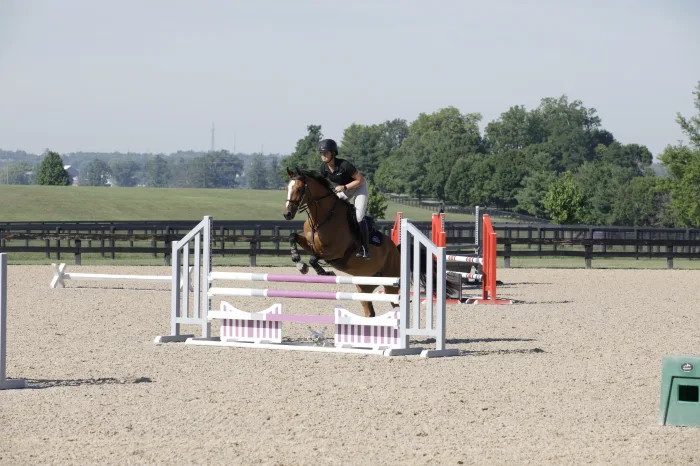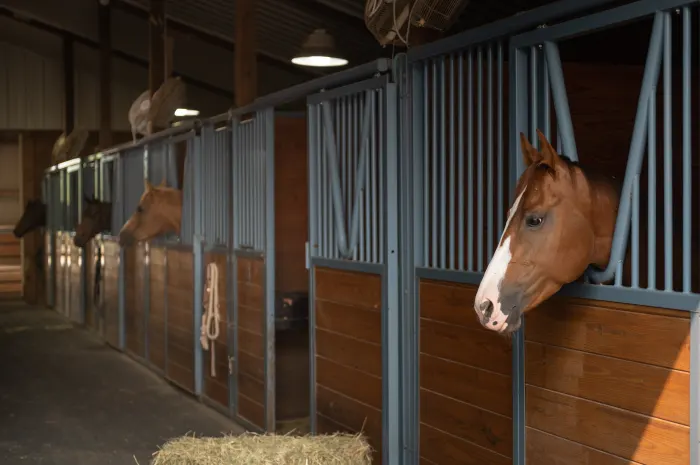PAID PROMOTION
By Dr. Fairfield T. Bain, Merck Animal Health
As the temperatures cool, season-culminating events ramp up along with some equine infectious diseases like equine herpesvirus (EHV) and equine influenza virus (EIV). This makes fall and winter an ideal time to focus in on precautionary measures to protect your horse—and your competition schedule.

ADVERTISEMENT
While vaccination is the foundation of protection against infectious disease, taking some practical physical precautions broadens your horse’s level of protection. These biosecurity measures not only help prevent highly contagious diseases including EHV and equine influenza but also equine protozoal myeloencephalitis (EPM), a disease that increases along with increased opossum activity in cooler temperatures. Implementing a biosecurity program that helps limit the spread of disease between horses (and disease-carrying critters) can be as simple as taking these steps.
- Vaccinate. Work with your veterinarian to determine your horse’s custom vaccination plan. The American Association of Equine Practitioners guidelines on vaccinations for adult horses break vaccinations into two categories: Those recommended for every horse and those needed by certain horses based on their situation. To determine your horse’s vaccine needs, your veterinarian considers the diseases endemic to your area and the following variables:
- Living situation. If your pasture shares a fence with your neighbor, viruses don’t know which horses belong to you versus your neighbor. The same is true if your horse lives in a boarding facility.
- Travel status. Horses being transported or shipped and those competing are particularly susceptible to infectious disease, especially equine influenza, because they come into contact with many horses and environments and often are immunocompromised (immune system cannot respond appropriately) due to stress.
- Age. Broodmares and foals require vaccinations timed appropriately for gestation and weaning, respectively. Senior horses may experience declining immune function. As a result, vaccination strategies for senior horses may require further customization.
- Practice Biosecurity At Home. The best offense is a good defense. Taking these simple precautionary measures at your barn helps keep your horse healthy and ready whether you’re prepping for a show or about to hit the road.
- Include all your horses in your vaccination program. A single unprotected horse can serve as a reservoir of infection to others.
- Practice good hygiene and cleanliness, such as regularly washing your hands, cleaning out stalls and washing water sources.
- Remove manure from pastures and paddocks at least twice a week.
- Feed hay and grain in raised containers to prevent parasite exposure from manure contamination.
- Keep feed and grain stores secured to avoid enticing unwelcome visitors, such as opossums, which can harbor the organism that causes EPM.
- If horses have returned from traveling or are new to your barn, separate them for at least two weeks and monitor them daily for fever and signs of infectious disease.

- Stay Vigilant On The Road. Biosecurity becomes even more important when you’re traveling. The stress of the travel itself, plus the exhilaration of competition and being around different horses can magnify infectious disease threats. To help, take these simple biosecurity measures when you’re away from home:
- Minimize nose-to-nose contact with other horses.
- Don’t share items, including lead lines, halters, water buckets or tubes of oral medications.
- Regularly clean your tack, equipment and stalls.
- Monitor your horse’s temperature daily so you’ll know what’s “normal.” Deviations from normal might signify an infectious illness. Contact your veterinarian if you note a rise in temperature.
- Practice good hand hygiene, washing your hands after handling each horse. (Hand sanitizers work well in the absence of soap.)
- Keep horse health records on hand at all times (health certificates are required for entry at most events and shows).
ADVERTISEMENT
Vaccination is effective in preventing infectious disease, but with highly contagious diseases such as EHV and equine influenza, vaccination alone may not stop the spread. Coupling a customized vaccination protocol with some basic biosecurity measures will help keep your horse healthy and competition-ready. For more information on protecting your horse from infectious diseases, visit PrestigeVaccines.com.
About The Author
Fairfield T. Bain, DVM, MBA, DACVIM, DACVP, DACVECC, is Associate Director of Strategic Development and Innovation (Equine) for Merck Animal Health. A graduate of Auburn University, School of Veterinary Medicine, Dr. Bain’s distinguished career includes extensive experience in practice, academia and within the industry. He is known especially for his work in perinatology and neonatal intensive care, cardiovascular disorders, pathology and hyperbaric oxygen therapy.
Copyright © 2022 Merck & Co., Inc., Rahway, NJ, USA and its affiliates. All rights reserved.
This content was paid for and provided by Merck Animal Health. The views and opinions expressed in this article do not necessarily reflect those of The Chronicle of the Horse.















